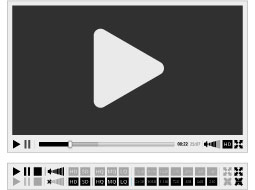Online courses directory (548)
Learn how to design secure systems and write secure code.
This course aims to give students the tools and training to recognize convex optimization problems that arise in scientific and engineering applications, presenting the basic theory, and concentrating on modeling aspects and results that are useful in applications. Topics include convex sets, convex functions, optimization problems, least-squares, linear and quadratic programs, semidefinite programming, optimality conditions, and duality theory. Applications to signal processing, control, machine learning, finance, digital and analog circuit design, computational geometry, statistics, and mechanical engineering are presented. Students complete hands-on exercises using high-level numerical software.
Acknowledgements
The course materials were developed jointly by Prof. Stephen Boyd (Stanford), who was a visiting professor at MIT when this course was taught, and Prof. Lieven Vanderberghe (UCLA).
6.803/6.833 is a course in the department's "Artifical Intelligence and Applications" concentration. This course is offered both to undergraduates (6.803) and graduates (6.833). 6.803/6.833 is designed to help students learn about progress toward the scientific goal of understanding human intelligence from a computational point of view. This course complements 6.034, because 6.803/6.833 focuses on long-standing scientific questions, whereas 6.034 focuses on existing tools for building applications with reasoning and learning capability. The content of 6.803/6.833 is largely based on papers by representative Artificial Intelligence leaders, which serve as the basis for discussion and assignments for the course.
This free online Diploma in Multimedia Development course covers the skills and techniques needed to create professional-looking videos, visual effects, motion graphics and animations. The course offers a rigorous exploration of key multimedia tools including Adobe Photoshop, Windows Movie Maker, Adobe Flash, Audacity, Director MX and Adobe After Effects. <br /><br />The video-based tutorials are delivered in a non-technical and step-by-step manner by the award-winning multimedia teacher Russell Stannard. The Diploma course is ideal for those who want to gain a thorough knowledge and understanding of multimedia development tools and techniques and who want to enhance their career prospects in the process.<br />
This course covers concepts of computation used in analysis of engineering systems. It includes the following topics: data structures, relational database representations of engineering data, algorithms for the solution and optimization of engineering system designs (greedy, dynamic programming, branch and bound, graph algorithms, nonlinear optimization), and introduction to complexity analysis. Object-oriented, efficient implementations of algorithms are emphasized.
Principles of Applied Mathematics is a study of illustrative topics in discrete applied mathematics including sorting algorithms, information theory, coding theory, secret codes, generating functions, linear programming, game theory. There is an emphasis on topics that have direct application in the real world.
This course was recently revised to meet the MIT Undergraduate Communication Requirement (CR). It covers the same content as 18.310, but assignments are structured with an additional focus on writing.
Aprende los aspectos fundamentales de Photoshop para edición de imágenes digitales de una forma práctica y clara.
Lecture Series on Digital Systems Design by Prof.D.Roychoudhury, Department of Computer Science and Engineering,IIT Khar
This course teaches techniques for the design and analysis of efficient algorithms, emphasizing methods useful in practi
Wavelets are localized basis functions, good for representing short-time events. The coefficients at each scale are filtered and subsampled to give coefficients at the next scale. This is Mallat's pyramid algorithm for multiresolution, connecting wavelets to filter banks. Wavelets and multiscale algorithms for compression and signal/image processing are developed. Subject is project-based for engineering and scientific applications.
Learn how to use Flash CS5.5 with ultimate flash cs5 tutorials to create Interactive Content.
The topics covered in this course include interactive proofs, zero-knowledge proofs, zero-knowledge proofs of knowledge, non-interactive zero-knowledge proofs, secure protocols, two-party secure computation, multiparty secure computation, and chosen-ciphertext security.
Lecture - 24 GraphsrnLecture Series on Data Structures and Algorithms by Dr. Naveen Garg, Department of Computer Science
6.831/6.813 examines human-computer interaction in the context of graphical user interfaces. The course covers human capabilities, design principles, prototyping techniques, evaluation techniques, and the implementation of graphical user interfaces. Deliverables include short programming assignments and a semester-long group project. Students taking the graduate version also have readings from current literature and additional assignments.
This is an intermediate algorithms course with an emphasis on teaching techniques for the design and analysis of efficient algorithms, emphasizing methods of application. Topics include divide-and-conquer, randomization, dynamic programming, greedy algorithms, incremental improvement, complexity, and cryptography.
This course instructs students on how to develop technologies that help people measure and communicate emotion, that respectfully read and that intelligently respond to emotion, and have internal mechanisms inspired by the useful roles emotions play.
6.161 offers an introduction to laboratory optics, optical principles, and optical devices and systems. This course covers a wide range of topics, including: polarization properties of light, reflection and refraction, coherence and interference, Fraunhofer and Fresnel diffraction, holography, imaging and transforming properties of lenses, spatial filtering, two-lens coherent optical processor, optical properties of materials, lasers, electro-optic, acousto-optic and liquid-crystal light modulators, optical detectors, optical waveguides and fiber-optic communication systems. Students engage in extensive oral and written communication exercises. There are 12 engineering design points associated with this subject.
The Acoustics of Speech and Hearing is an H-Level graduate course that reviews the physical processes involved in the production, propagation and reception of human speech. Particular attention is paid to how the acoustics and mechanics of the speech and auditory system define what sounds we are capable of producing and what sounds we can sense. Areas of discussion include:
- the acoustic cues used in determining the direction of a sound source,
- the acoustic and mechanical mechanisms involved in speech production and
- the acoustic and mechanical mechanism used to transduce and analyze sounds in the ear.























